Kopi Luwak is a coffee that has been regarded worldwide as the best coffee (a lot) of money can buy. The coffee cherry is passed through the gut of an animal called a civet. Civets are found throughout Asia and some parts of Africa and have a very varied wild diet which includes fruit, insects, small mammals and a very small portion of coffee if it is available.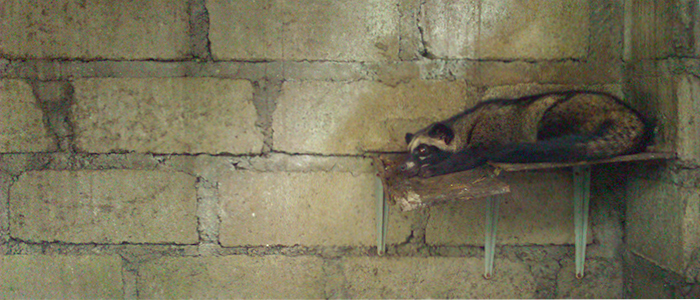
It is very rare that I do anything very ‘touristy’ when travelling; however, I made a ‘tourist-based’ stop on a recent trip to the Island of Bali purely for a personal experience to see what in fact it is that tourists are being told about this insidious industry.
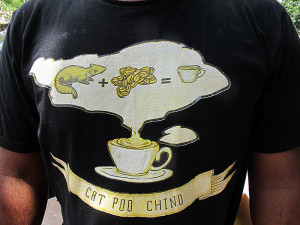 My husband Michael and I stopped at a KOPI LUWAK (Civet Coffee) ‘information centre’ between Denpasar and Ubud. As soon as we got out of the car, Michael said “I can smell civets”, he has a nose for these things and when we are in the forest, he often smells an animal before he sees it. We parked on the opposite side of the road to the centre and the smell was pungent… oddly pungent. There must be a lot of civets we thought.
My husband Michael and I stopped at a KOPI LUWAK (Civet Coffee) ‘information centre’ between Denpasar and Ubud. As soon as we got out of the car, Michael said “I can smell civets”, he has a nose for these things and when we are in the forest, he often smells an animal before he sees it. We parked on the opposite side of the road to the centre and the smell was pungent… oddly pungent. There must be a lot of civets we thought.
Entry to the centre was ‘free’ and a lovely girl took us on the basic tour. She showed us how the KOPI LUWAK is made from beginning to end (apart from the fact that civets are often taken from the wild, she never mentioned that!)
So, we wandered around the centre which was set on an acre or so of tree-lined paths with our lovely guide and viewed the civets in small, concrete-lined cages. The cages were clean but bare, with only one branch in each enclosure. As we walked around, we viewed the interpretive tables that explained the coffee making process, where tourists are encouraged to feel and smell the coffee beans so as they can personally tell the difference between ‘regular’ coffee and ‘civet’ coffee. 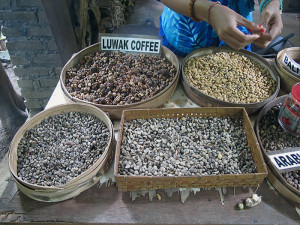 We were offered an espresso sized cup of Kopi Luwak for $5.00. “It tastes so much better than ‘regular’ coffee, why don’t you compare?” our guide invited. It was blindingly obvious to us that the battered, old, unsealed tin of ‘regular’ coffee offered to us for our comparison, contained a sample of old and stale coffee that must have been there for months. I dare say, the freshly roasted ‘civet’ coffee may have in fact tasted better than its stale rival in this instance.
We were offered an espresso sized cup of Kopi Luwak for $5.00. “It tastes so much better than ‘regular’ coffee, why don’t you compare?” our guide invited. It was blindingly obvious to us that the battered, old, unsealed tin of ‘regular’ coffee offered to us for our comparison, contained a sample of old and stale coffee that must have been there for months. I dare say, the freshly roasted ‘civet’ coffee may have in fact tasted better than its stale rival in this instance.
So, I am one of these people that like the truth; I am straightforward, so I asked the questions instead of sitting silent to see what industry mantra I would receive.
Here are the ‘so-called’ facts from this particular KOPI LUWAK centre.
The photos accompanying this article are of the civets living in ‘fairly good’ conditions, but of course, nowhere near the intended wild environment they should be experiencing. Usually Kopi Luwak producing, captive civets are in cages where they can barely turn around, or even lay down. The animals in these production centres are unnaturally obese and have severe health issues as a result. Even in the ‘tourist approved’ cages at this particular information centre, the civets such as the individual pictured below were blind and overweight.
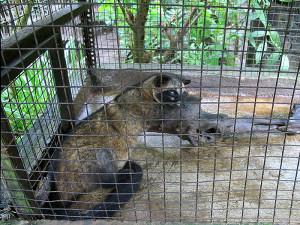
So, I’m going to do some basic calculations for this particular ‘Kopi Luwak Information Centre’. I’ll be fair and conservative to start with: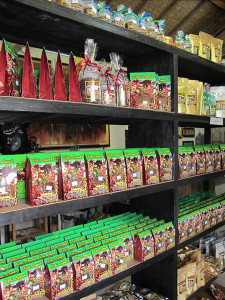
60 civets produce 2kg of coffee a day.
2kgs @ USD$60.00 = USD$120.00 per civet
USD$120.00 x 60 = USD$7200.00 PER DAY
If I am not conservative with my calculations;
60 civets produce 5kg of coffee a day.
5kgs @ USD$60.00 = USD$300.00 per civet
USD$300.00 x 60 = USD$18,000 PER DAY
Sadly, this is only one small civet farm on the island of Bali, which is a small player in the Kopi Luwak market.
The production of Luwak coffee is a 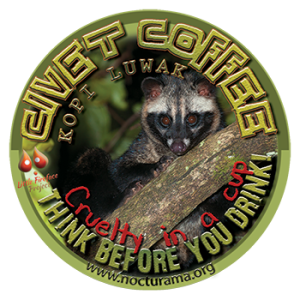 multi-million dollar industry that won’t be shut down in a hurry. This is due to the popularity of the product; the result of clever marketing strategies that specifically target ill-informed individuals that never question how their purchased product is in fact produced and the cruelty endured by the enslaved wild animals that have been stolen from the wild.
multi-million dollar industry that won’t be shut down in a hurry. This is due to the popularity of the product; the result of clever marketing strategies that specifically target ill-informed individuals that never question how their purchased product is in fact produced and the cruelty endured by the enslaved wild animals that have been stolen from the wild.
THINK BEFORE YOU DRINK – Kopi Luwak is Cruelty in a cup
Sharon Williams
LFP Coordinator/Environmental Education Officer

